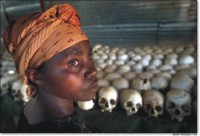Rights Monitor
Rwanda Genocides: Killing of survivors threatens justice
 Rwandan police and judicial authorities must ensure prompt and effective law enforcement to deal with recent killings of participants in the justice system for genocide known as gacaca, Human Rights Watch said in a report published.
Rwandan police and judicial authorities must ensure prompt and effective law enforcement to deal with recent killings of participants in the justice system for genocide known as gacaca, Human Rights Watch said in a report published.
The 20-page report, Killings in Eastern Rwanda, documents two incidents in late November 2006 in which 13 persons were killed. On November 19, genocide survivor Frederic Murasira was killed in the commercial centre of Mugatwa in eastern Rwanda. Within hours, residents of a nearby village inhabited by genocide survivors killed eight Mugatwa residents who apparently had played no part in the murder. The victims included children aged three, six, eight and 13, as well as two women and a 70-year-old man. One suspect has surrendered to police and has been arrested for the killing of Murasira, and several others have been detained for the reprisal killings.
“Killings of genocide survivors cost human lives and threaten the delivery of justice,” said Alison Des Forges, senior Africa advisor to Human Rights Watch. “Prompt and effective law enforcement is the way to deal with this threat, not reprisal killings. Reprisal killings have been rare in the past, but if they become more frequent, they could spur a new cycle of violence.” Gacaca jurisdictions, established to prosecute crimes committed during the 1994 genocide, have been trying suspects throughout Rwanda since July. Since that time, survivor groups have expressed alarm at attacks on survivors and witnesses.
The suspect in the killing of the genocide survivor, once imprisoned on charges of genocide, had been provisionally released and was awaiting trial before a gacaca jurisdiction. The uncle of the victim is a gacaca judge who was reportedly prepared to make new accusations against the suspect. Rwandan officials have said that 16 genocide survivors were killed in 2005 and seven in 2006, but survivor groups estimate the number to be around 20 per year for the last several years.
In a second incident, a gacaca judge was murdered in Rwamagana district on November 23. Police promptly arrested three suspects. One, a half-brother of the victim, had reportedly tried unsuccessfully to get the murdered judge to quash genocide charges against him. Police shot and killed the three suspects the evening of their arrest. According to police authorities, the killings were in self-defense during an abortive escape attempt. Evidence from the scene and witness testimony suggest that the three may have been victims of extrajudicial execution. A police investigation of the killings that apparently cleared the officers leaves a number of important questions unresolved.
“An effective and independent investigation into these lethal shootings in custody is essential,” said Des Forges. “In any society, deaths in custody at the hands of law enforcement must be subject to the highest scrutiny. Police officers as well as citizens must be held accountable if they commit crimes."
Source: Human Rights Watch